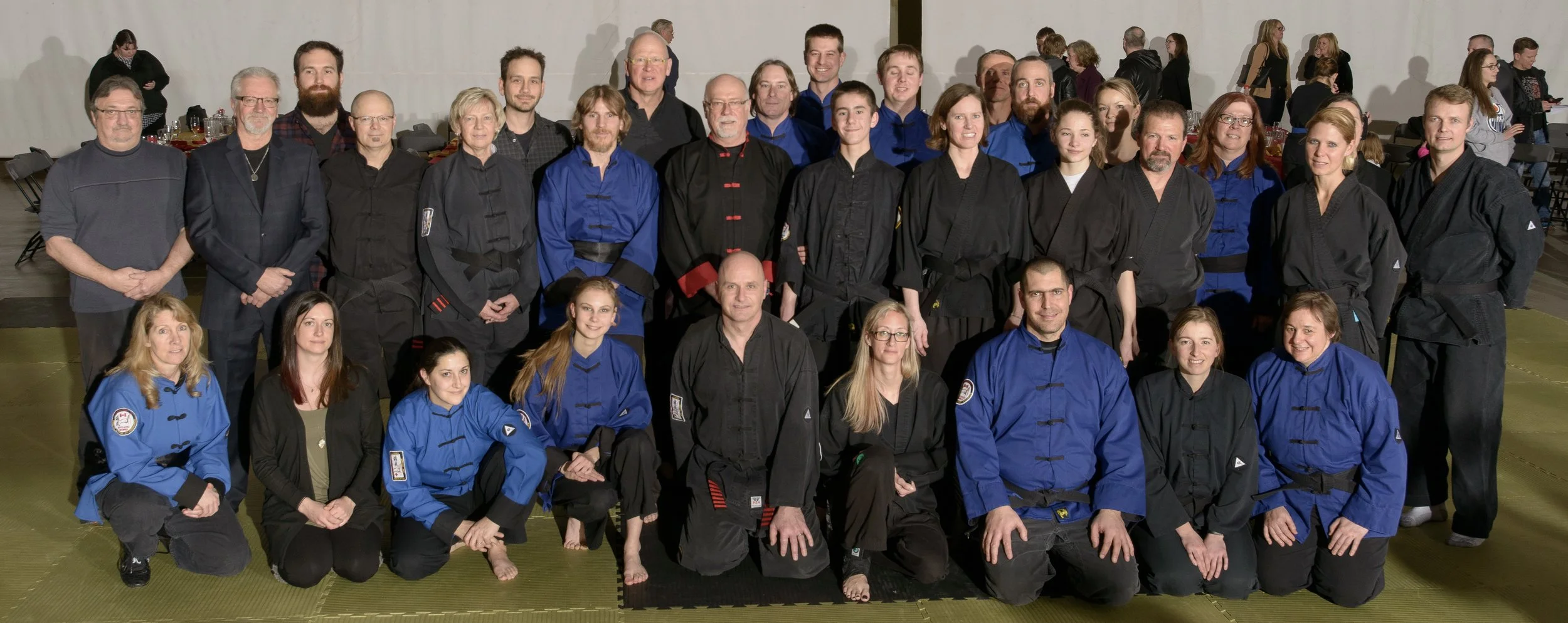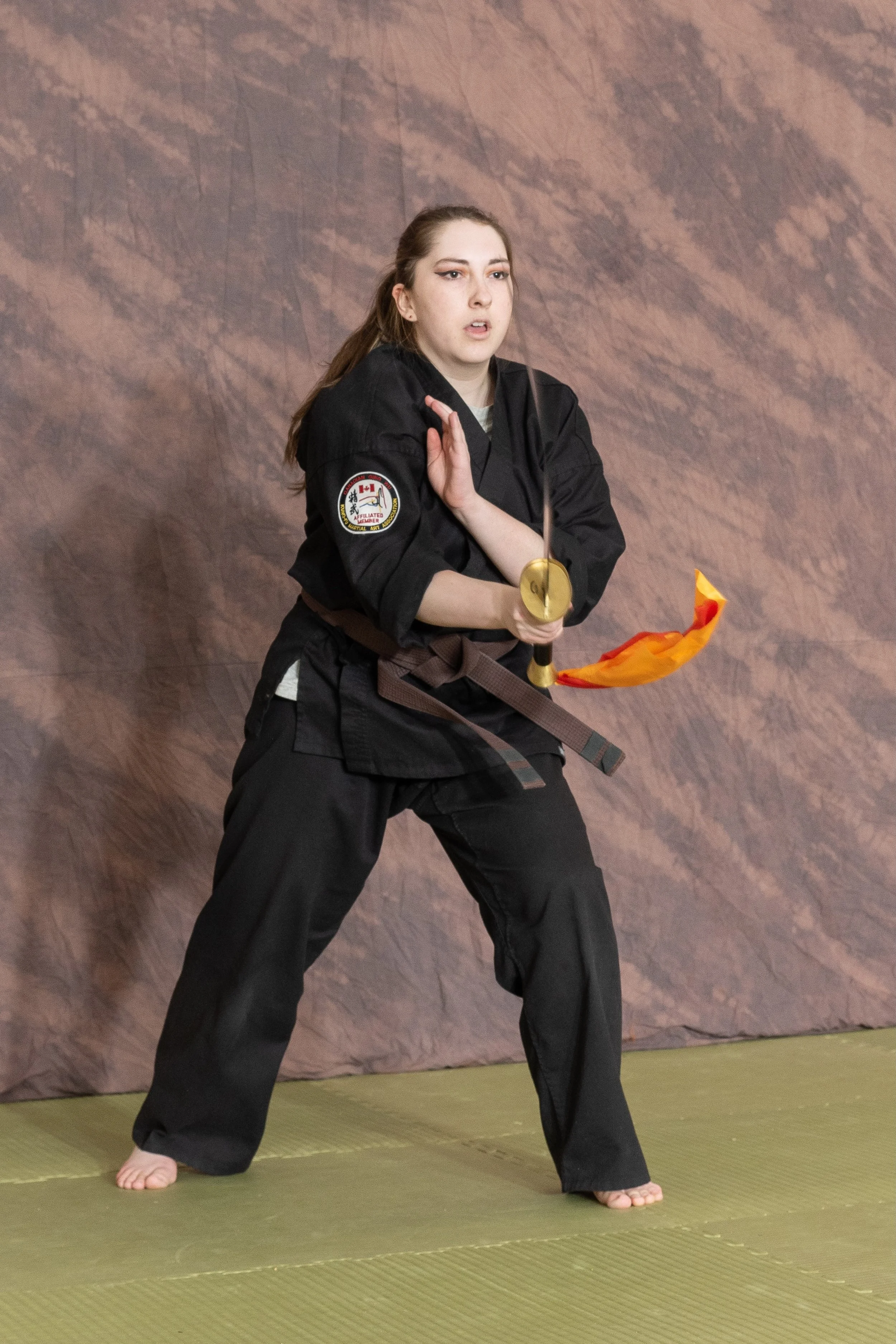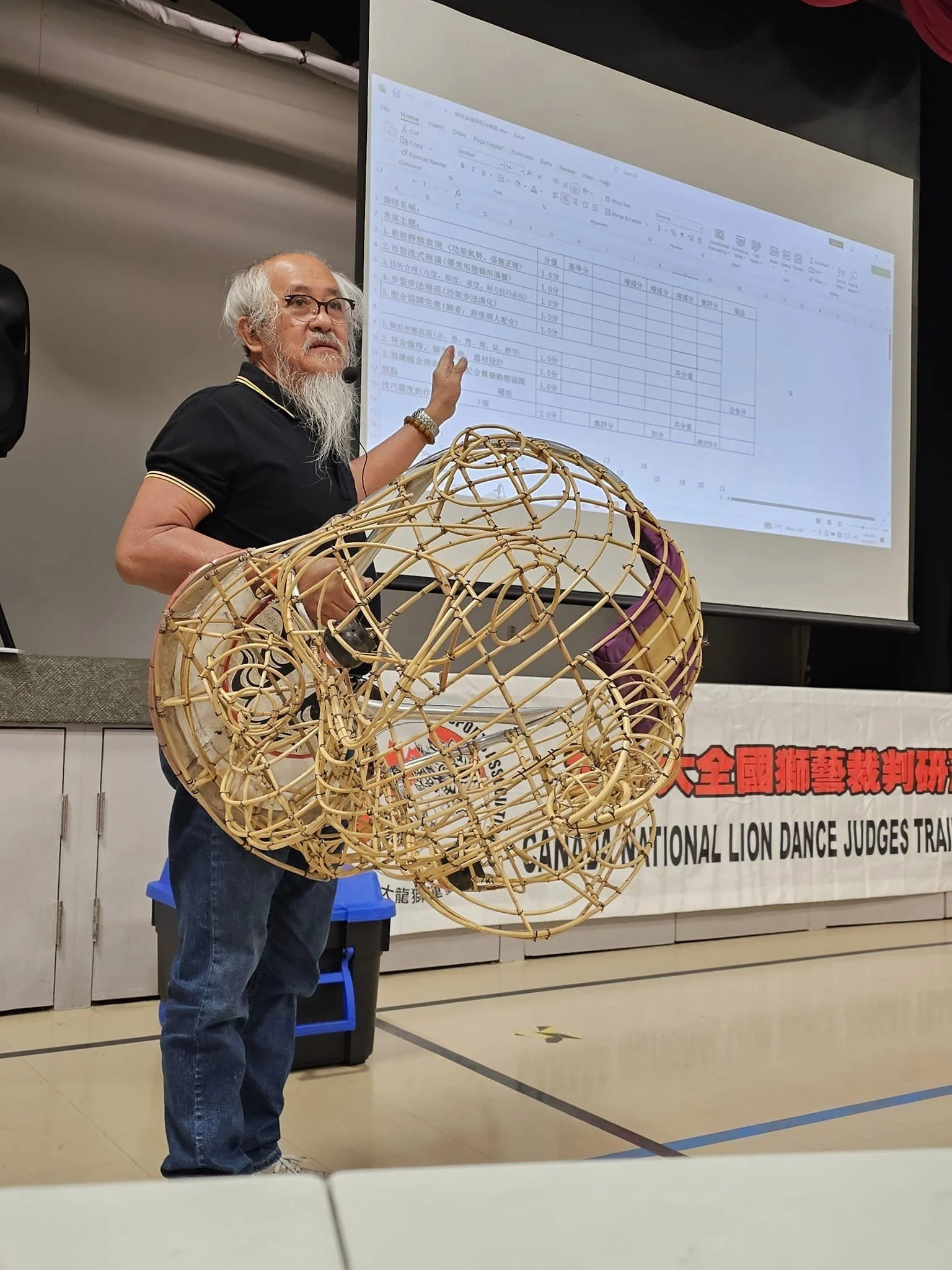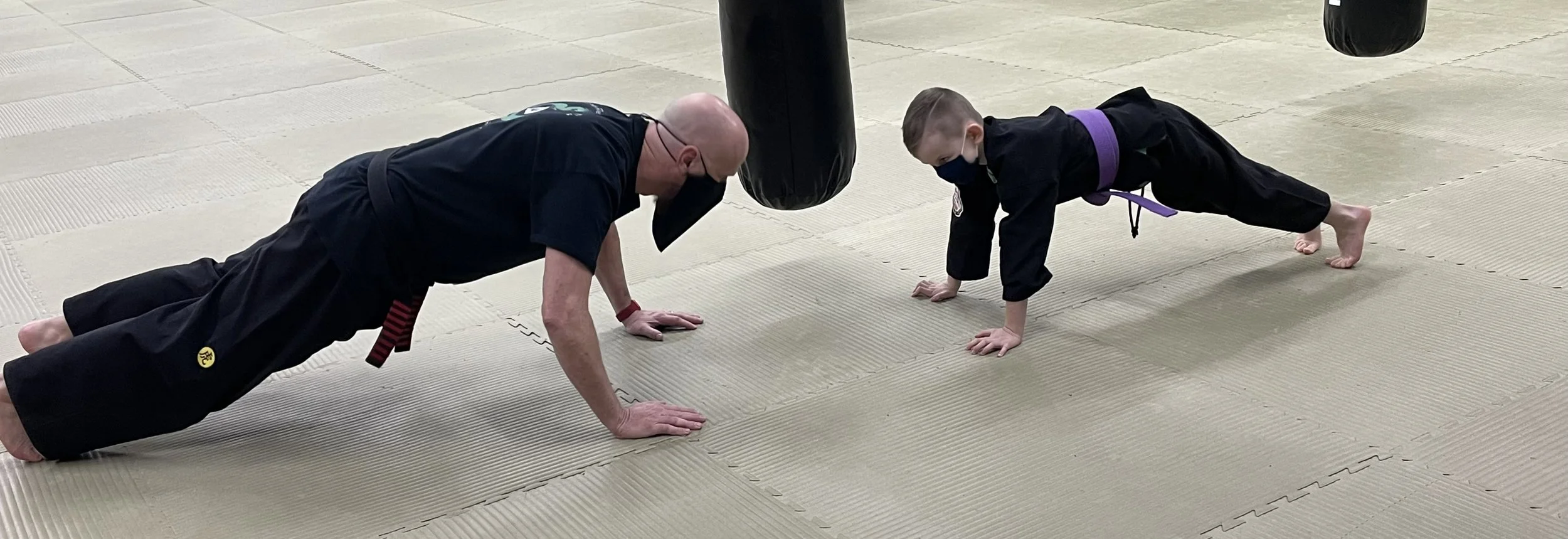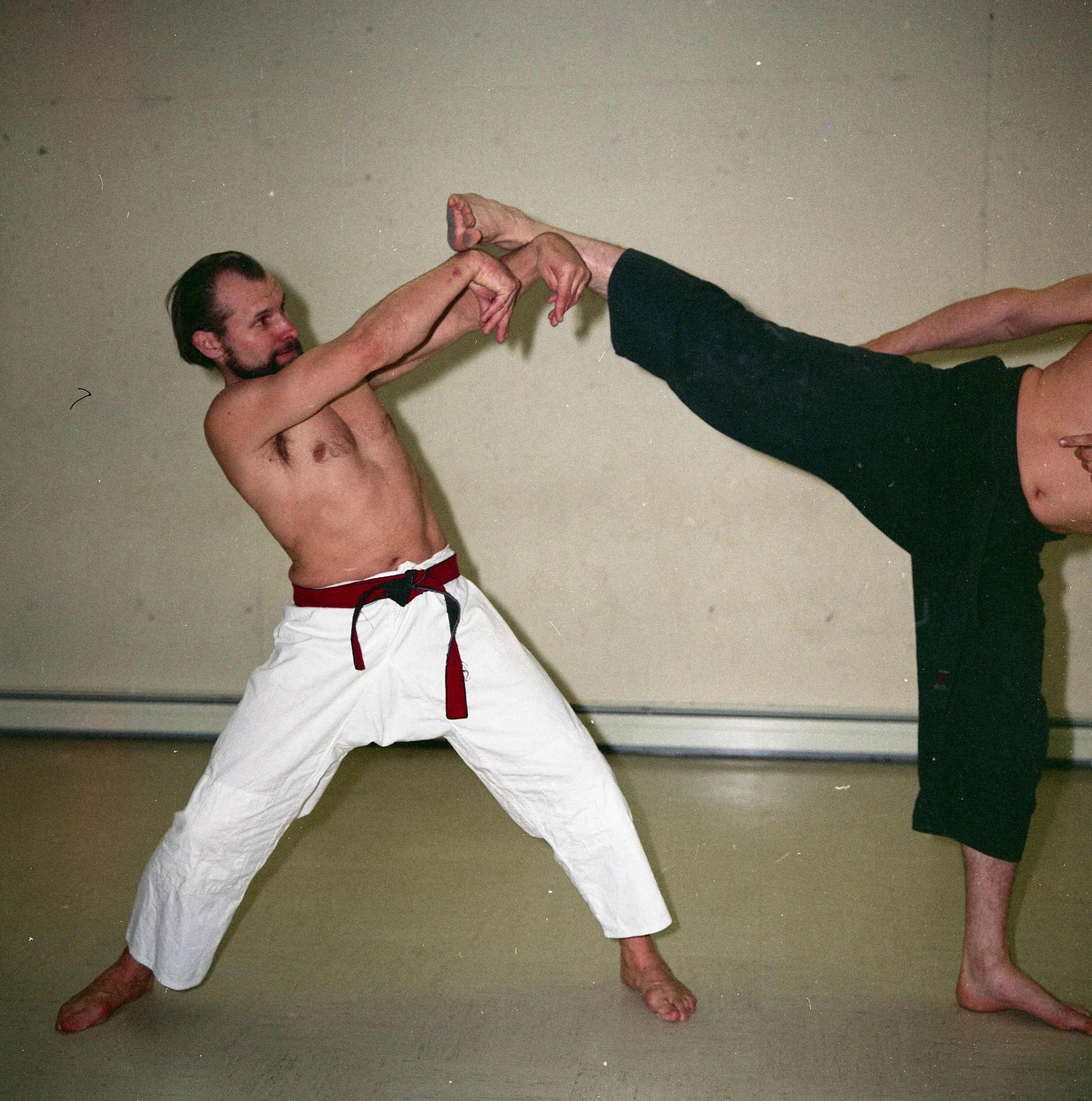Black Belt/Candidate Presentations and Black Belt Ceremony
With the changes we have implemented this year to the black belt grading process, the one thing that I am concerned about is how to give the candidates the same sense of accomplishment provided by a twelve hour grading process that we controlled, as the new process where the candidates have all the control and responsibility. I have spent the past couple of months considering how to give the upcoming scheduled Black Belt Demo Day on December 2nd a sense of ritual and ceremony for the candidates.
Max and Eva will remember the black belt grading that we had tried experimenting with a twice a year grading cycle so that people who failed to pass did not have to wait a full year to try again. The people who graded in the spring had to wait until the following February to get promoted during the banquet. They felt a big disconnect between their grading and their promotion. What I am concerned about with our new process is that there will be a disconnect between their I Ho Chuan year of development and the results of a forty-five minute demonstration.
A solution to this problem can be found in combining the candidates’ demonstration day with the black belt ceremony. By finishing their demonstration day with the black belt ceremony, we will be providing ritual and ceremony to highlight the scope of their accomplishments.
Candidate Demonstration and Black Belt Ceremony 2024
We push the planned demonstration day for the candidates from December 2nd, 2023 to January 6, 2024.
The black belts looking to be promoted to higher degrees will perform their presentations in front of the Master Instructors at 2:30 pm. *
The black belt candidates will perform their presentations in front of the entire grading board at 3:30pm. *
The black belt ceremony with all the black belts will begin at 5pm. **
* Only ‘qualified’ black belts and candidates will be allowed to present as determined by their IHC process.
** Only candidates who have successfully ‘passed’ their grading will take part in the ceremony.
Future presentations/ceremonies will run at different times, depending upon how many candidates will be performing that year.
This format will also see the duties of the grading board evolve to reflect the weight being put on the I Ho Chuan process. My vision is that the grading board will stay intact as it is with the board members monitoring the candidates (both 1st degree brown belts and black belts) and submitting quarterly assessments so that the candidates are getting real-time feedback as their year progresses. Any board member who is part of the I Ho Chuan team AND seeking higher promotion will recuse themselves from the grading board for that year so that they are solely focused on their own development and grading.
Black Belt Grading Evolution
In light of how ill-prepared candidates tend to be when it comes to their actual grading, it is obvious that our current method is not working.
Our current method is built around the I Ho Chuan process. The idea is for the candidates to faithfully use the process consistently throughout the year to evolve into well-prepared black belts who are able to adequately challenge the black belt grading day.
Since its inception in 2011/2012 as a mirror to the Ultimate Black Belt Test, the IHC process has not fulfilled its promise. While the process has been proven to work, only two people have ever followed it to the letter. Both those people found the actual grading day to be easily managed and both passed the grading with flying colours.
The I Ho Chuan is expected to be the main tool for our candidates to achieve black belt status, but it is not the only tool or the only way. The idea was for the majority of candidates to use the IHC process while a few outliers may find another path. The problem that exists today is that out of all the candidates in the past 10 years, only two have actually used the IHC process to achieve their goal while the rest have been the outliers trying to achieve black belt through other means and strategies.
With these irrefutable historical facts in front of us, I feel that the time is ripe for us to make decisive changes that address these known issues as opposed to adding even more tools to the process. I believe that by eliminating most of our current tools and funneling the candidates deeper into the IHC environment, we will reverse the trend from the IHC process users being the outliers of the grading process. We have had 100% success with the candidates who have focused on the IHC process so I have no reason to believe we need any other tools for the candidates to prepare for their black belt.
PROPOSED PROCESS
Consistently frame the IHC process as the actual Black Belt Grading and eliminate grading day in its current form. This will force ALL candidates to embrace the process and cease counting on last minute changes and the grading day itself to pull their efforts out of the fire.
Quantify the candidates’ grading year by establishing a grading scale that takes into account four main categories:
Forms - grades based upon what we are seeing in class and seminar opportunities
Fitness - grades based upon three fitness tests conducted throughout the year during their in person classes or other seminars and events.
IHC Requirements - grades based upon their consistent fulfillment of their IHC commitments.
Engagement - grades based upon their overall attendance record in their core classes, their teaching commitments, and their participation in SRKF school events and activities.
We are already mostly there. We have eliminated the syllabus and fitness requirements from the students’ eyes and we have simplified the syllabus (forms-wise) to help the students narrow their focus on what is most important. We now need to eliminate the grading day in its current form and transition it to a shorter day where they have qualified to attend based upon achieving a minimum grade in the four main categories. I believe grading day can be reduced to only the personal demo that can include their five applications and four board breaks.
The idea of this new process will be to instill a sustainable training discipline within the candidates that will ensure their adequate skill and effort at the end of the year-long process. The grading day will provide the final sense of accomplishment within the candidates without giving them an alternate path around the IHC process.
If we can establish a real-time grade for each candidate, there will be a constant reminder for them to stay engaged with their IHC requirements and empower them to make the adjustments necessary to qualify to present their demo on grading day.
Notes for Curricular Goals Meeting
With our meeting looming this Sunday, I thought I would share some of my thought process with you all to help save some time in the meeting.
A black belt must be of strong moral character first and foremost and, for the most part, I am satisfied with this aspect of the vast majority of our candidates. So it is the physical shortcomings that continue to be my greatest concern.
For me it is always the basics that I am most frustrated about in our black belt gradings. Stances, kicks, forms, etc. I rarely am super satisfied with our candidates performance of these basic techniques. We have tried several strategies to improve our outcomes on these shortcomings but, to date, nothing has had a satisfying impact on improving these techniques.
We have tried simplifying our syllabus so that the students would have more time to practice the basics. This is a solid strategy but it also is dependant upon the student actually practicing on their own. So far - failure.
We have tried moving to a rotating syllabus/curriculum to ensure proper exposure to the techniques happens, along with regular review. This has seen an improvement of overall knowledge in our candidates but only a slight corresponding improvement in skill followed. Probably due to a lack of meaningful practice on the student part.
We have removed student access to the syllabus with the goal of getting them to work more on skill and less on knowledge. This strategy has definitely worked as we are seeing a refreshing and effaceable approach by our Level 1 students who have never seen the syllabus. It will be a while before this change translates to better black belts because the next few years are going to be candidates who have copies of the old syllabus at their disposal.
So moving forwards I have a couple of ideas to share, along with where I would like to see a shift in focus.
A rotating curriculum/syllabus is definitely something we have to pursue. It organizes our classes better and it ensures that all the students, no matter what program they are enrolled in, are learning the same things at the same time. This will make for an easier transition when they change classes.
There is a certain amount of synergy between different syllabus stripes that will allow us to exploit for a more efficient rotation schedule. I see a strong relationship between:
White (6 harmonies) and Yellow (Vocabulary of motion),
Blue (Traditional Tenets) and Red (Keystone Principles),
Black (Wuxin) and Orange (Dynamic Control).
I am committed to double down on the traditional aspect of our curriculum/syllabus. It is the adherence to traditional values and techniques that makes our school unique and strong. With that in mind, I feel very strongly about expanding our Lion Dance syllabus to improve our students’ lion dance skills and to bring us closer in harmony with the international lion dance community.
In the past we have shied away from doing too much lion dancing in class because that takes away from the core basics that the grading board is so concerned about. However if we recognize the close correlation between lion dancing and our Keystone Principle techniques, then shifting our focus to more lion dancing should actually improve our students’ core basic techniques.
I hope these notes help generate ideas and engagement within our group. See you all Sunday.
Goals for Curricular and Syllabus Development
As per the normal state of things, we are currently working on enhancing and revising both the syllabus and curriculum. This article is meant to serve as a quick reference and documentation of our intent.
For reference;
Curriculum- refers to the overarching concepts and ideals that we are striving to develop in our students.
Syllabus- refers to the list of tools available to the instructors in their endeavours to develop the Curriculum in the students.
Our general plan of attack is as follows;
Give feedback to Sifu Brinker on the current Curriculum, what we see missing or what would benefit from more clairity.
Curriculum rewrite, better defining our overall concepts and goals as a school.
Define what we as the grading board want to see in the “end product”; qualities we want to see further developed in the candidates or qualities that we see in our candidates that need to be recognized and retained.
Development of Progressive Requirements that directly support what we want to see in future candidates.
Syllabus rewrite, to best support the goals and objectives that have been defined in the process.
Our meeting, scheduled on Sunday, July 16 @ 8pm is meant to be a step in this process, so we can begin to solidify the direction the Syllabus needs to take in order to best serve and support the Curriculum. If we can definitively identify what qualities we value and desire in the future candidates, then we can begin to find the gaps in our current approach to the Syllabus and in general.
Black Belt Grading Process 2022
After decades of adjusting and amending our grading process to improve student outcomes, we find ourselves continually struggling to solidify a process that addresses all the problems and roadblocks being experienced by our black belt candidates.
We all are in agreement that the biggest issue our candidates face is mental, not physical. They tend to intellectualize their training and consistently fail to take physical action with their intellectual breakthroughs. As their teachers we can tell them where they are lacking but we have no control on how they ultimately go about addressing our feedback.
An ideal process acknowledges and embraces certain absolutes and values:
Not everyone is able to earn a black belt.
We (teachers) tend to be too involved.
Our grading process should provide bread crumbs to help the candidates find their way. It should not be providing stepping stones.
A candidate should always question their skill, never their effort.
Our students tend to channel their focus to serve the grading process as opposed to pursuing mastery.
There is a black belt standard and that standard is absolute for each individual. It is about each candidate's effort, not just their skill. When we say effort, we are talking about more than just their blood and tears. We're also talking about the sustainable process they use to achieve mastery. This defines their standard:
Ideal - 60% test result after 100% effort.
Not ideal - 90% test result after 60% effort.
Mastery of the curriculum - not just the syllabus.
Moving forward, we have agreed upon an approach to address historical challenges while reinforcing the ideal of mastery over mindless training to pass a test within our students
We will eliminate student access to the CPRS fitness document so that, ideally, a candidate's first exposure to the specifics of the fitness test would be their grading day.
We will remove absolutes for the students. All quantification of their progress will be only for the Board, not the candidates.
The I Ho Chuan year will be the main tool the Board will use to decide Pass/Fail.
The grading day will be the main tool the Board will use to convince the candidates that they earned their promotion or that they did not earn it.
Rather than always seeking to modify our grading process to improve outcomes, we will leave the process alone and focus on modifying our teaching to reinvest in the tools we already have at our disposal by improving their efficacy:
Bring three main focuses into every class:
Warmup
Skill drills with intensity
Main lessons/meat
Continually focus on curriculum in our teachings and redirect and encourage our students to do the same in their learning. Remember - we have a curricular standard, not a syllabus standard.
Jeff Brinker
